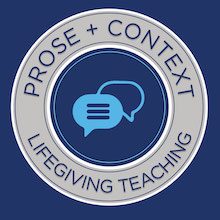Podcast: Play in new window | Download
Subscribe: Apple Podcasts | RSS | More
“As a Christian Teacher, ‘Life is a Highway’”
Karen E. B. Elliott,
English Faculty (1997-present)
On more than one occasion, I will have a frustrated student sigh and boldly ask, “Mrs. Elliott, why do we have to read this?” It’s a fair question, so instead of getting defensive because they’ve just attacked one of the so-called greatest works of literature and it’s also a personal favorite (which might be why we’re reading it), I ask the entire class, “All right, why do we read this? Why should we?” After that, a great conversation inevitably ensues; however, if I let it, things start to evolve. For each student it gets personal.
Naturally, questions create controversy, and controversy is not always fun—especially at a Christian school. As an English teacher, this is where the fun begins and where class size is always an issue—the more students, the more questions—and I’ve got Milton and that other Shakespeare play to finish before midterm exams?! Classroom management suddenly feels like “whack-a-mole” and I can’t get them to remember the difference between denotation and connotation. This is when it gets challenging and frustrating at an Evangelical, international, inter-dominational Christian school. I have to cover all this, and lead them to Christ!
And yet, Christ is exactly the only reason I am here. My subject is just a medium. It is through my passion for literature which Christ (in spite of my sinful self) works through me and somehow draws students toward Him. And I don’t know why we are surprised when God does this through secular works written by people who don’t believe in Him, at least not publicly. Yet, we are all made in the image of God, and many authors unknowingly further our relationship to the One who has forgiven them, too, even if they have no inkling that they need forgiveness…even if a few of their ideas are, quite frankly, unforgivable. Am I any different? And yet, God uses even me to help a particular student with serious questions—ones that will eventually determine their eternal life.
I am a marked woman. I have been asked to boldly and with great difficulty and elegance keep one foot in the world, but the other one under-no-circumstances not of it. Teaching literature at a well-known, high-standard, Christian school in Boston-proper is nothing short of challenging. I must be careful. As an intellectual and Evangelical in the classroom, I feel as though I’m driving along the Pacific Highway. I’m so close to the rising paganistic-atheistic edge, that if I let my intellect or ego get the best of me, I teeter into the abyss and end up over my head in the eternal waters; however, if I trust in God, which is so difficult to do most of the time, I’ve got my best foot anchored to His side, and the journey is beautiful and He shows me the world in His proper perspective.
This is what I hope to do with my students as we peer into the world, become aware of the jagged edges, the seductive and engulfing waters below, and how to help each other face the challenges it takes to journey in this beautiful but dark world where most of the time, the guardrails are few and far between.
When I review literary terms with my AP class, we often revisit “irony.” It’s not what happens is unexpected or the opposite. Irony is what was intended becomes the opposite.
And ironically, many of my students are brought to Christ through much of the literature that we explore in class. It’s through some of the most famous authors who unknowingly draw us unto the One who led them to inkwell or typewriter that reinforce my beloved students’ beliefs that there is absolute Truth and an all-knowing God who loves them, and asks much of them, but will, and has already, journeyed the worst road possible.
